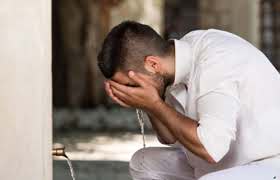Partial ablution (wudu ') Published by learn Quran online
The word "Wudu" means
"purity" or "beauty".
Learn Quran online has a mission to guide the students. In Sharia, the term voodoo is used to refer to washing and rubbing certain parts of the body. Ablution decorates and cleanses the parts of the body that are washed, and its traces in the form of white stars and white rings on the feet and hands will be visible on the Day of Resurrection, as indicated by the words of the Prophet quoted in one of the habits: “Indeed, on the Day of Resurrection, the members of my community will be to address, calling them “gurran muhajjalina” because of the traces of ablution, so let the one who can enlarge his star do it ” (Al-Bukhari).
Establishing Partial Ablution
1.
Performing ablution becomes obligatory
(fard) in the case when a person in a state of minor defilement wishes to
perform a prayer, be it a funeral prayer or prostration while reading certain
verses of the Koran. Allah Almighty said: “O
you who believe! When starting to pray, wash your faces and hands up to the
elbows, and wipe your heads and (wash) your feet up to your ankles ... ”
(Quran, 5: 6).
It is reported from the words of Abu Hurayra, may Allah be pleased
with him, that the Messenger of Allah said: "A prayer will not be accepted
from the defiled one until he takes ablution" (Al-Bukhari).
Ablution will also become
mandatory if a person who is in a state of minor defilement wishes to touch the
Qur'an, because in the message that the Messenger of Allah sent to 'Amr bin
Hazm, it was said: "... and let only the clean Qur'an touch the
Qur'an" ( Malik; an-Nasa'i; ad-Darakutni).
Many commentators of the
Qur'an associated the words of the Almighty
"Only those who are purified
[1] touch him ..." (Qur'an, 56:79) with the absence of defilement and
everything that defiles.
The fakikha argued that the imputation of the
obligation to perform ablution for one who wants to touch the Qur'an is
practical. This means that the judgment of the unbelief of a person who does
not comply with this command is wrong. The fact is that the words of the
Almighty "Only those who are purified touch him" do not directly
indicate (dalil kat'y) the obligation to perform ablution, but, perhaps, are a
message about the Kept Tablet,
to which only angels touch: "Truly, this is the Noble The Qur'an (stored) in the Secret
Scripture ” (Qur'an, 56: 7778).
2.
Ablution (wajib) must be performed before
circumambulating the Ka'aba, since circumambulation is one of the types of
worship, similar to prayer. The Prophet said: “Walking around the House (Ka'aba)
is like prayer, except for the fact that during this tour you are talking. Let
the one who starts talking during the detour speak only about the good ”
(At-Tirmidhi; an-Nasa'i; al-Hakim).
3.
Washing before bed is considered desirable
(sunnah). Al-Bara 'b. 'Azib, may Allah be pleased with him, narrated that the
Messenger of Allah told him:“Oh this, if you want to go to bed, perform the
same ablution as you do before prayer, lie on your right side and say:“ O
Allah, I surrendered to You, and turned my face to You, and entrusted You with
my work, and I turned to You in search of shelter at will and out of fear
(before You). There is no refuge and no salvation from You, except (turning) to
You! I believed in Your Scripture, which You sent down, and in Your Prophet,
whom You sent (Allahumma, inni aslamtu nafsi ilyaikya, va vajjahtu vajhi
ilyaikya, va favwadtu amri ileikya wa alja'tu zhbataganlyayakya raqya raqa'ya.
wa la manja minkya illa ilaikya! Amantu bikitabikallazi anzalta wa
binabiyyikallazi arsalta) ”. And, verily, if you die that night, then (you will
die) in the state inherent in you from birth (fitra), and if you live until the
morning, (Al-Bukhari; Muslim).
It is reported
that Ibn 'Umar, may Allah be pleased with both of them, said: “In the hair of
the one who spends the night clean, an angel sleeps, and when a person wakes
up, the angel must say:“ O Allah, forgive such Thy servant ”” (Ibn Hibban).
4.
Ablution is desirable (mustahabb) to be
performed periodically, as the Prophet constantly did it. This was one of his
usual activities, and therefore the fuqaha considered it not a Sunnah, but a
desirable thing.
In addition, it
is advisable to perform ablution after renouncing the commission of sins and
repentance. It is narrated from the words of Abu Huraira that the Messenger of
Allah said: “When a slave (of Allah) who professes Islam (or: a believing
slave) performs ablution and washes his face, he comes off his face with water (or:
together with the last drop of water) everything sinful that he looked at with
his own eyes; when he washes his hands, all the sinful things that he took with
them come down with the water from his hands, and when he washes his feet,
along with the water, all the sinful things they were heading to come down from
his hands (and this continues until then, ) until he comes out free from sins ”
(Muslim).
It is narrated from the words of 'Uthman bin'
Affan, may Allah be pleased with him, that the Messenger of Allah said:
"Sins will leave the body of the one who will perform ablution properly,
even going out from under his nails" (Muslim). Learn Quran online is the best to learn Quran.




Comments
Post a Comment